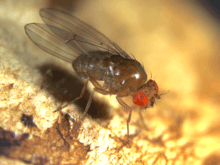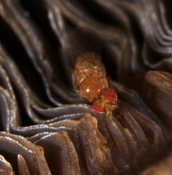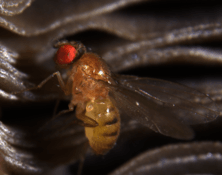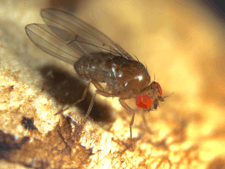Mushroom-feeding Drosophila
Mushroom-feeding Drosophila (mycophagous Drosophila) are a subset of Drosophila flies that have highly specific mushroom-breeding ecologies. Often these flies can tolerate toxic compounds from Amanita mushrooms.[1][2]

Drosophila innubila, a mycophagous Drosophila, on a mushroom
Species groups
- Drosophila testacea species group
- Drosophila quinaria species group
- Drosophila bizonata species group
- Some members of the Drosophila obscura species group
Sequenced genomes or transcriptomes
Gallery
 D. neotestacea (Testacea species group)
D. neotestacea (Testacea species group) D. testacea (Testacea species group)
D. testacea (Testacea species group) D. innubila (Quinaria species group)
D. innubila (Quinaria species group)
gollark: ++delete <@319753218592866315>
gollark: ++deletee <@319753218592866315>
gollark: Banning me for calling you a nonagon would be VERY nonagonal.
gollark: You are a nonagon.
gollark: He muted me in VC!
References
- Jaenike, John (1978). "Host Selection by Mycophagous Drosophila". Ecology. 50 (6): 1286–1288. doi:10.2307/1938245.
- Tuno, Nobuko; Takahashi, Kazuo H.; Yamashita, Hiroshi; Osawa, Naoya; Tanaka, Chihiro (1 February 2007). "Tolerance of Drosophila Flies to Ibotenic Acid Poisons in Mushrooms". Journal of Chemical Ecology. 33 (2): 311–317. doi:10.1007/s10886-006-9228-3. PMID 17195114.
- Koshikawa, Shigeyuki; Giorgianni, Matt W.; Vaccaro, Kathy; Kassner, Victoria A.; Yoder, John H.; Werner, Thomas; Carroll, Sean B. (2015). "Gain of cis-regulatory activities underlies novel domains of wingless gene expression in Drosophila". Proceedings of the National Academy of Sciences. 112 (24): 7524–9. Bibcode:2015PNAS..112.7524K. doi:10.1073/pnas.1509022112. PMC 4475944. PMID 26034272.
- Hamilton, P. T.; Leong, J. S.; Koop, B. F.; Perlman, S. J. (2014). "Transcriptional responses in a Drosophila defensive symbiosis". Molecular Ecology. 23 (6): 1558–70. doi:10.1111/mec.12603. PMID 24274471.
- Hill, T.; Koseva, B. S.; Unckless, R. L. (2019). "genome of Drosophila innubila reveals lineage-specific patterns of selection in immune genes | Molecular Biology and Evolution | Oxford Academic". Molecular Biology and Evolution. 36 (7): 1405–1417. doi:10.1093/molbev/msz059. PMC 6573480. PMID 30865231.
This article is issued from Wikipedia. The text is licensed under Creative Commons - Attribution - Sharealike. Additional terms may apply for the media files.